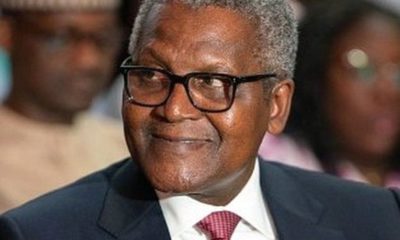Business
NASCON Reports 84% Growth in PAT

NASCON Allied Industries Plc turned in an impressive growth in all performance indicators in the year ended December 31, 2022, with profit after tax surging by 84 percent, from N2.97 billion to N5.47 billion.
The company’s shareholders consequently gave kudos to the management, at the 2022 annual general meeting (AGM) at the weekend in Lagos.
Analysis of the food seasoning company’s annual report indicated that profit before tax rose significantly by 98 percent, from N4.24 billion to N8.37 billion, representing an increase of N4.12 billion. Turnover was on the upswing, increasing from N33.28 billion to N58.79 billion, a 77 percent increase compared to 2021.
Earnings per share also increased to 206 kobo in 2022 in contrast to 112 kobo in 2021. A total of N2.65 billion is to be paid as dividend compared to N1.06 billion in 2021.
A shareholder, Tunde Badmus, applauded the management for the impressive performance and efficient running of the company, amid harsh economic environment. Badmus appreciated the company for the dividend declared despite what he described as the challenging operating environment.
In the same vein, former National Coordinator, Independent Shareholders Association of Nigeria, Anthony Omojola, lauded the board and management of NASCON for improved performance and declaration of dividend. Omojola said that the company had remained consistent in dividend payment over the years.
He, however, urged the company to work with registrars and investors relations department to tackle the rising unclaimed dividends in the market.
The shareholders approved a dividend payment of N1 per 50k share, totalling N2.65 billion as recommended by the board. This was in contrast with N1.06 billion or 40k per share declared in the comparative period of 2021.
According to Chairman, NASCON, ‘Yemisi Ayeni, the company reduced greenhouse gas emissions by five per cent during the accounting period.
Ayeni said the company implemented waste reduction programmes and achieved a 28 percent reduction in hazards and non-hazardous waste generated.
She said, “We have strengthened our relationships with our employees, customers, suppliers, and communities and supported initiatives that promote social well-being.
Acting Managing Director, NASCON, Thabo Mabe, pointed at insecurity, congested ports and poor road infrastructure, unstable power supply along with employee emigration, traffic gridlock and foreign exchange issues as factors which constituted challenges of doing business in 2022.
Mabe expressed optimism that “2023 will involve capitalisation on our gains, leading to greater productive efficiency and enhanced resource utilisation in spite of the challenges in 2022.”
On future plans, he said that the company would continue to embrace strategies that would boost its market share. “Our core competence in our business is to refine crude salt for both human and animal consumption. This is an area that we have focused our business to attain leading customer service standards. Our plan for future growth is to continue to develop these markets and drive cost savings within the business, as input costs skyrockets.
“Nigeria is blessed with a huge consumer base and opportunities; we will be part of these opportunities and contribute our quota to power eradication,” he said.
The National Salt Company of Nigeria was established as a salt refinery at Ijoko, Ogun State in 1973, as a joint venture between the Federal Military Government of Nigeria and Atlantic Salt & Chemical Inc. of Los Angeles, California, USA.
The Company was privatised in 1991 with its shares listed on the Nigerian Stock Exchange in October 1992, through which Dangote Industries Limited purchased majority shares. Following the reverse takeover of NASCON by Dangote Salt Limited (DSL) in 2007, NASCON acquired the assets, liabilities, and business undertakings of DSL.
Principal activities of the company include processing raw salt into refined, edible, and industrial salt. NASCON is also into the production of seasoning and vegetable oil.
Business
ADF Flags Off N16Bn 2025 National Food Intervention Programme

Over one million Nigerians nationwide will receive a 10kg bag of rice each, with the Aliko Dangote Foundation (ADF) distributing the staple food as part of the 2025 Annual National Food Intervention Project.
The initiative, which commenced on Thursday would is estimated at a whooping cost of N16 billion.
During the flag-off of the nationwide distribution in Kano, Chairman of the Foundation, Alh Aliko Dangote, said the distribution of one million bags of 10kg rice to the poor and vulnerable Nigerians in the 774 Local Government Areas (LGA) in Nigeria was in line with the core values of his businesses and the ADF.
Dangote, who was represented by his daughter, Mariam Aliko Dangote said, “This annual initiative, which embodies compassion, solidarity, and shared responsibility, is part of our response to the current economic challenges facing our nation. It reflects our commitment to supporting our communities in line with our core values.”
ALSO READ: BREAKING: Rivers Chief Judge Under Probe For Alleged Age Falsification
He highlighted that the Foundation was kicking off the distribution in Kano State, after which it will proceed to other states, assuring that all arrangements are in place to ensure the food reaches those who need it most in all the LGAs of Nigeria.
Dangote, reputed to be Africa’s wealthiest person opined that food remains a basic human necessity, and this is why the ADF adopted the practice of embarking on a food distribution programme across Nigeria.
“We are collaborating with state governments to ensure that the food reaches the most vulnerable individuals in each state,” he added.
According to Dangote the ADF focuses on improving the living conditions of Nigerians through support for projects which tackle hunger and water supply problems, strengthen the quality and scope of health and education, and promote economic empowerment at the community level.
“Your excellency, I believe that today’s event will help in tackling hunger and helping the most vulnerable people in breaking their fast. We are playing our role in enhancing the living conditions of our people. I urge other industrialists and firms to lend a helping hand in combating hunger through programmes and initiatives that will place food on the tables of vulnerable Nigerians. This job should not be left to the government alone, rather we need a public private partnership that will help us in fighting the scourge.
“I commend the government at all levels for their efforts at addressing the food crisis. I am certain that with time, we shall overcome these challenges, therefore let us support the government to achieve its target of a better life for Nigerians, “he said.
On his part, Kano State Governor, Abba K. Yusuf, who flagged off the National Food Intervention Programme commended the good gesture and said the intervention reflects the unwavering commitment of Alh Dangote in addressing poverty and hunger in Nigeria.
The Governor, who was represented by his Deputy, Comrade Aminu Abdulsalam Gworzo said 120,000 bags of 10kg rice will be distributed across the 44 Local Government Areas of the state.
He described Alh Dangote as humane, adding that: “A similar event took place last year where he personally oversaw the distribution of food stuff to the poor in this very arena.”
To ensure transparency in the distribution process, he said the state government has set up a committee comprising of relevant ministries, CSOs, religious leaders, departments and agencies, local authorities, the Hisbah Board and security agencies.
Managing Director and Chief Executive Officer of the Aliko Dangote Foundation, Zouera Youssoufou, said the Annual National Food Intervention Project is a way of giving back, and supporting governments in fighting poverty and hunger in Nigeria.
She said that Alh Dangote is passionate about philanthropy and committed to ensuring that hunger is wiped out or reduced to the minimum in Nigeria.
“We are going to other states to distribute the products, but we’ve just flagged off in Kano,” she told newsmen on the sideline of the Kano Government House, venue of the flag off.
The Deputy Commander-General of Hisbah Board in Kano, Dr. Mujahid Aminudeen, thanked the ADF for the initiative, urging more Nigerians to emulate Alh Dangote in the humanitarian cause.
He said the Hisbah Board will ensure that the products reach the targeted beneficiaries.
One of the beneficiaries, Ibrahim Ahmed, speaking on behalf of others thanked Alh Dangote for his large heart saying the gift would go a long way in reducing food pressures on them especially during the Ramadan while also praying God to continue to help him in his businesses.
Recall that the ADF has been at the forefront of tackling and ameliorating the impact of natural disasters and health challenges in Nigeria and the rest of the world.
The ADF donated N153million to boost Nigeria’s fight against Ebola Virus Disease in 2014, $3million to the African Union (AU) to help combat the scourge, and N66.66 million to install thermal scanning systems and cameras at Nigeria’s 4 international airports.
During the COVID-19 pandemic, we donated N2billion to the CACOVID Fund, a Private Sector task force in partnership with the Federal Government, the Nigeria Centre for Disease Control (NCDC) and the World Health Organisation (WHO) with the sole aim of combating Coronavirus (COVID-19) in Nigeria.
In support for education, we donated a N1.2bn modern business school edifice to the Bayero University, Kano, a fully equipped 2,160-bed capacity hostel complex to the Ahmadu Bello University, Zaria and a N300 million building to University of Ibadan Business School.
Beyond the shores of Nigeria, the ADF has also recorded milestones with a donation of $1million, to lift victims of two earthquakes that devastated Nepal.
Business
Lawmakers Call For Immediate Reversal Of ATM Fee Increase

The Central Bank of Nigeria (CBN) is under pressure to suspend its recently introduced increase in Automated Teller Machine (ATM) transaction charges due to the country’s worsening economic conditions.
During Tuesday’s plenary session, Marcus Onobun, a lawmaker representing Esan Central/Esan West/Igueben Federal Constituency in Edo State, raised concerns over the policy through a motion of urgent public importance.
He noted that the CBN’s directive not only increases withdrawal fees but also removes free ATM transactions for customers using other banks’ machines, adding to the financial strain on Nigerians.
SEE ALSO: Direct CBN To Suspend ATM Fee Hike Pending Court Verdict, SERAP Tells Tinubu
According to the new regulations, customers withdrawing from their own bank’s ATMs will still enjoy free withdrawals.
However, those using other banks’ ATMs will now be charged N100 for withdrawals of N20,000 within a bank’s premises. At off-site ATMs, such as those in shopping malls or markets, the charge remains N100, but with an added N500 surcharge.
Onobun, a member of the Peoples Democratic Party (PDP), argued that Nigerians are already struggling with economic difficulties, including high inflation, rising fuel costs, increased electricity tariffs, and multiple banking fees.
He warned that the additional charges could further discourage financial inclusion, particularly among low-income earners, contradicting the CBN’s own agenda.
“The banking sector continues to record significant profits, yet customers are being burdened with more charges without any improvement in service delivery or infrastructure. This is unfair and unacceptable,” he stated.
Following his motion, Speaker Tajudeen Abbas put the matter to a voice vote, and lawmakers overwhelmingly supported it.
As a result, the House of Representatives called on the CBN to immediately halt the implementation of the policy until further consultations are held with relevant banking and finance committees.
Business
NNPC Ltd Clarifies Naira-Crude Contract With Dangote Refinery

The Nigerian National Petroleum Company Limited (NNPC Ltd) is already emplacing an new naira for crude contract with the Dangote Petroleum Refinery and Petrochemicals, because the initial contract was for six months which expired in March 2025.
This clarification was made in a statement in Abuja by the Chief Corporate Communications Officer, NNPC Ltd, Olufemi Soneye on Monday.
ALSO READ: Naira-For-Crude Policy Still-In-Force – Chairman, Technical Sub-Committee
According to Soneye, the NNPC Limited has noted recent reports circulating on social media regarding the alleged unilateral termination of the crude oil sales agreement in Naira between NNPC Ltd. and Dangote Refinery.
To clarify, the contract for the sale of crude oil in Naira was structured as a six-month agreement, subject to availability, and expires at the end of March 2025. Discussions are currently ongoing towards emplacing a new contract.
Under this arrangement, NNPC Ltd. has made over 48 million barrels of crude oil available to Dangote Refinery since October 2024. In aggregate, NNPC Ltd. has made over 84 million barrels of crude oil available to the Refinery since its commencement of operations in 2023.
NNPC Limited remains committed to supplying crude oil for local refining based on mutually agreed terms and conditions.




















